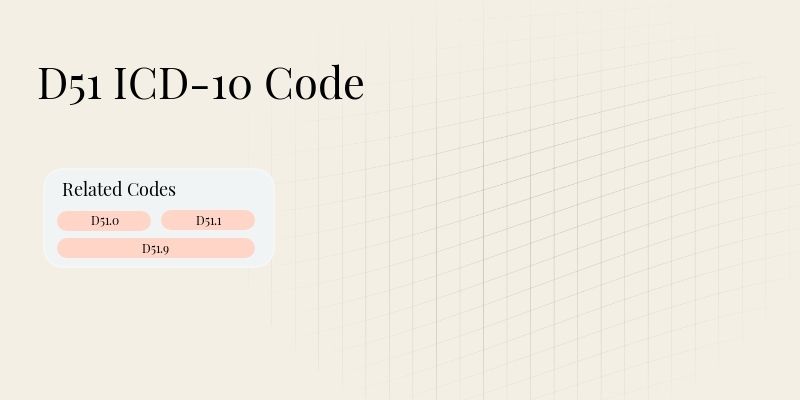
D51 ICD-10 Code: Vitamin B12 deficiency anemia

Key Takeaways
- What D51 ICD-10 Code Covers: This code specifically addresses Vitamin B12 deficiency anemia, a condition resulting from insufficient levels of Vitamin B12, which is essential for red blood cell production.
- Session duration requirements: Diagnosis and treatment plans may require multiple visits, typically ranging from 1 to 3 sessions to assess symptoms and response to treatment.
- Who can use the code: Medical professionals such as physicians, nurse practitioners, and physician assistants can document and bill for this condition when appropriately diagnosed.
- Best practice for proper use: Ensure accurate documentation of symptoms and laboratory findings to support the diagnosis. Include patient history and any treatments administered to justify the billing.
- Example of actual usage: A patient presents with fatigue and pallor; a blood test reveals low Vitamin B12 levels, leading to the appropriate use of D51 for billing purposes.
What is D51 ICD-10 Code
The D51 ICD‑10 code designates Vitamin B12 deficiency anemia, a hematological condition characterized by a lack of Vitamin B12, which is critical for proper red blood cell formation. This deficiency can lead to megaloblastic anemia, where the body produces large, abnormal red blood cells that cannot function effectively, resulting in symptoms such as fatigue, weakness, and neurological issues.
Vitamin B12 deficiency can arise from various factors, including dietary deficiencies, malabsorption syndromes, or certain medical conditions. Accurate coding using D51 is crucial for appropriate diagnosis and treatment, ensuring that patients receive the necessary care and follow‑up for this condition.
Services Covered Under D51 ICD-10 Code
The services covered under this code primarily involve diagnostic assessments and treatment options for Vitamin B12 deficiency anemia.
Service | Description | Frequency |
|---|---|---|
Complete Blood Count (CBC) | A blood test to evaluate red blood cell levels and identify anemia. | As needed based on symptoms. |
Vitamin B12 Level Testing | Measurement of Vitamin B12 levels in the blood to confirm deficiency. | Typically once per visit until stabilized. |
Intramuscular B12 Injections | Therapeutic injections to replenish Vitamin B12 levels in patients. | Initial treatment may require weekly injections, followed by monthly maintenance. |
Patient Education | Guidance on dietary sources of Vitamin B12 and potential supplements. | Provided at initial diagnosis and follow-up visits. |
Who Can Use the D51 ICD-10 Code?
This code can be utilized by a variety of healthcare professionals involved in diagnosing and treating anemia due to Vitamin B12 deficiency.
- Primary Care Physicians: They often initiate diagnosis and treatment plans for patients presenting symptoms of anemia.
- Hematologists: Specialists who may further evaluate patients with complex anemia cases.
- Nurse Practitioners: Can assess, diagnose, and prescribe treatments for Vitamin B12 deficiency.
- Physician Assistants: Often provide care in collaboration with physicians and can document and bill for this diagnosis.
How to Use D51 ICD-10 Code
Utilizing this code effectively requires precise documentation and adherence to best practices.
- Document Symptoms: Clearly note symptoms such as fatigue and pallor; for example, "Patient reports fatigue and weakness, presenting with pallor during examination."
- Include Laboratory Findings: Ensure results from blood work are included in documentation; for instance, "CBC shows low hemoglobin and low Vitamin B12 levels."
- Outline Treatment Plan: Clearly describe the treatment approach; for example, "Patient to receive weekly B12 injections for four weeks, followed by monthly maintenance."
- Follow-Up Visits: Schedule and document follow-up assessments; for example, "Patient to return in one month for re-evaluation of B12 levels."
Reimbursement Rates for D51 ICD-10 Code
Insurance Type | Reimbursement Rate | Notes |
|---|---|---|
Medicare | $120 per session | Includes diagnostic tests and treatment. |
Private Insurance A | $150 per session | Varies by policy; check for specific coverage. |
Private Insurance B | $130 per session | May require prior authorization. |
Medicaid | $100 per session | Coverage may differ by state. |
Disclaimer: Reimbursement rates are subject to change based on various factors, including geographic location and insurance provider policies. This article will be updated with average prices as they evolve.
Benefits of D51 ICD-10 Code
The D51 code provides several benefits in medical coding and billing processes.
Benefit | Importance |
|---|---|
Accurate Diagnosis | Ensures that patients receive appropriate treatment for Vitamin B12 deficiency anemia. |
Streamlined Billing | Facilitates accurate billing and reimbursement for services rendered. |
Improved Patient Care | Encourages timely follow-up and management of anemia symptoms. |
Enhanced Data Collection | Assists in tracking the prevalence of Vitamin B12 deficiency in populations for research and health statistics. |
Common Mistakes to Avoid with D51 ICD-10 Code
Mistakes in coding can lead to audits, denials, and ultimately affect patient care. Understanding common pitfalls can help mitigate these risks.
- Inaccurate Documentation: Failing to document symptoms and test results can lead to denials. For example, a physician may neglect to include lab results that confirm Vitamin B12 deficiency.
- Using Incorrect Codes: Confusing D51 with other anemia-related codes can result in billing errors. A nurse practitioner might mistakenly code for iron deficiency anemia instead of Vitamin B12 deficiency.
- Omitting Follow-Up Care: Not documenting follow-up appointments can lead to incomplete treatment records. For instance, a patient’s follow-up visit for B12 re-evaluation is not recorded, causing issues with continuity of care.
- Ignoring Insurance Guidelines: Not adhering to specific insurance provider requirements for documentation can result in claim denials. A physician assistant may overlook the necessity of prior authorization for B12 injections under certain plans.
D51 ICD-10 Code vs other codes
Comparing the D51 code with similar codes can help clarify its specific use in medical coding.
Code | Description | Distinguishing Features |
|---|---|---|
D51 | Vitamin B12 deficiency anemia | Specifically related to Vitamin B12 deficiency and its associated anemia. |
D50 | Iron deficiency anemia | Refers to anemia due to lack of iron, requiring different treatment strategies. |
D53.9 | Other unspecified nutritional anemia | Used when the specific nutritional cause of anemia is not identified. |
D64.9 | Anemia, unspecified | General code for anemia without specifying the cause, less precise than D51. |
Conclusion
The D51 ICD‑10 code is essential for accurately diagnosing and managing Vitamin B12 deficiency anemia. Understanding its application, including the services it covers and the professionals who can use it, is crucial for effective patient care and proper billing practices. Ensuring accurate documentation of symptoms, laboratory findings, and treatment plans is vital for successful reimbursement. Common mistakes in coding can lead to financial implications and affect patient outcomes, making awareness of these pitfalls important. Comparing this code to similar codes helps clarify its specific usage, ensuring that healthcare providers can appropriately address their patients' anemia conditions.
Disclaimer: This article is for informational purposes only and does not constitute legal or medical advice. Always consult professional guidelines and regulatory bodies for specific compliance requirements.
Frequently Asked Questions
Reduce burnout,
improve patient care.
Join thousands of clinicians already using AI to become more efficient.

CO-11 Denial Code: Diagnosis/Procedure Mismatch
Discover essential insights on the CO-11 Denial Code code for health professionals. Enhance your practice and navigate billing with confidence.

R63.4 ICD-10 Code: Abnormal weight loss
Discover essential insights on the R63.4 ICD-10 Code code for health professionals. Enhance your practice and navigate billing with confidence.

G31.84 ICD-10 Code: Cognitive Impairment
Discover essential insights on the G31.84 ICD-10 Code code for health professionals. Enhance your practice and navigate billing with confidence.
